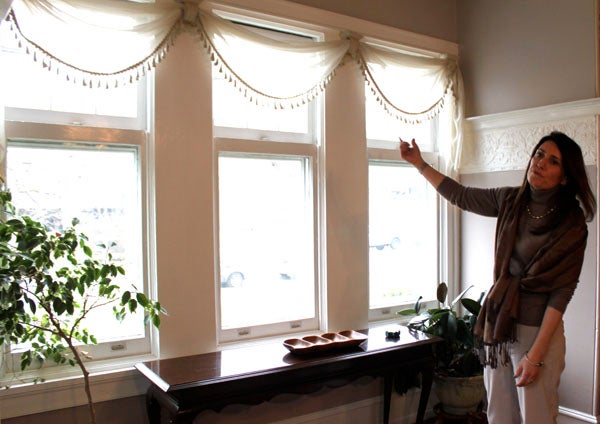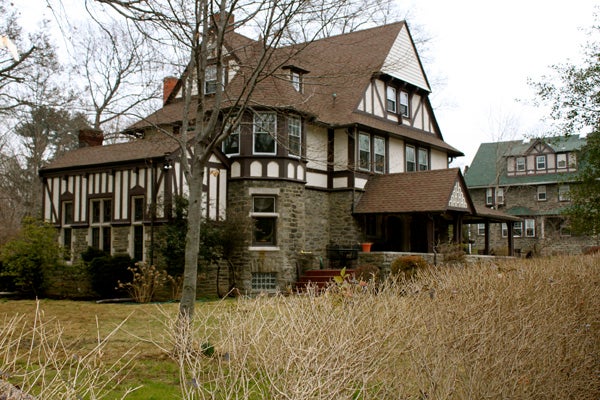Overbrook Farms: Neighborhood Club Advocates to Preserve Neighborhood [video]

by Connor Showalter and Jade C. McKenzie [Philadelphia Neighborhoods]
With the delay of the historic district designation for Overbrook Farms, Overbrook Farms Club continues to spread awareness about the importance of preserving residential homes and other structures in the neighborhood.
Stephanie Kindt, a board member of the Overbrook Farms Club, said she is determined to help preserve the neighborhood. Kindt, who lives on the 6300 block of Overbrook Avenue, said the next step for Overbrook Farms Club will be to use effective communication with residents in order to inform them on the possibility of a historic designation.
“We really need to be clear on exactly what the burden of historic designation will be and exactly what the homeowner will need to do differently, if anything at all, in terms of maintaining and keeping their homes up,” Kindt said.
Overbrook Farms Club, which is a homeowners’ association, was established in 1892, during the same time Overbrook Farms was founded. The organization is made up homeowners who serve and protect the historic nature of the community.
Overbrook Farms is located near the western border of Philadelphia and is bounded by 58th and 66th streets and Woodbine and City avenues and bisected by Lancaster Avenue. The neighborhood consists of about 500 buildings and was listed on the National Register of Historic Places in 1985.
One local resident of the 5600-block of City and Cardinal avenues said the historic designation is vital in order to keep commercial buildings and investors out of the neighborhood.
“We probably need protection from the onslaught of whoever would want to sell properties and turn Overbrook into something less than it is,” Thomas Cornell said. “Perhaps we need Philadelphia’s protection from those who would turn this historic area into a commercial area.”
However, Councilman Curtis Jones, Jr. and other residents residents, are concerned the historic designation would create an unnecessary burden for homeowners. If a historic district was approved for Overbrook Farms, it would create additional regulations and codes for homeowners to follow in order to preserve the neighborhood’s architecture.
“I think the property value will probably stay high because most historic areas hold their value a great deal,” said local resident Carmen Hardy, who lives on the 6300-block of Lancaster Avenue. “But the downfall will be you’ll have to maintain it the way they want you to maintain it, not the way you choose to maintain it.”
Hardy said the historic designation might be a financial issue for homeowners who need to repair or update their homes. Recently, she installed a new gate for her home, along with new shingles and windows.
“We’ve done everything we’ve wanted to the outside of the house,” Hardy said. “So we really don’t need anything else added on, but what about the other people?”

Kindt said the historic designation would ensure that the neighborhood’s style would be preserved for future generations. She added the Philadelphia Historic Commission doesn’t need the approval of residents through a public vote to pass the historic district designation.
“Historic designation isn’t about the people who live here now, it’s about the future. It’s about what we send into the future,” Kindt said. “So if you think about it, Overbrook Farms in a way is its own living museum of the past, of 100 years ago. So we’re sending it intact into the future.”
Overbrook Farms acts as a tourist attraction throughout the year, especially in April when it opens 10 homes for an annual house tour for visitors. The free tour highlights the neighborhood’s signature single-family detached and semi-detached residences.
The buildings in Overbrook Farms display late 19th century and early 20th century architectural styles and a majority of the houses are Colonial or Tudor Revivals, according to the Overbrook Farms Club’s website.
“There are a lot of buildings around here that are just beautiful and historic,” said Tara Plymouth, who grew up in Overbrook Farms. “There are several beautiful historic churches and a train station is nearby so it’s close to the Main Line.”
Kindt said a historic designation is also needed for the Overbrook Farms Club Foundation, which partners with the organization. The foundation is a non-profit that can receive grant funding for Overbrook Farms Club and its projects in the neighborhood.
“If a funder looks at our neighborhood and sees that we really care and we really trying to maintain the history here they’re so much more likely to grant us funding,” Kindt said. “I think it would benefit Philadelphia overall to have another area designated as historic.”
Currently, Overbrook Farms Club is looking to continue to sway public opinion in favor of the historic designation.
“Right now we’re in the process of trying to set up meetings with Councilman Jones’ office as well as some folks who were strongly opposed to try and sort out what’s the path forward,” Kindt said.
———
This is part of ongoing coverage as the Philadelphia Historic Commission has held public meetings during February to discuss the possibility for a vote to allow Overbrook Farms to become a historic district. The Overbrook Farms Club has requested the historic designation for the neighborhood since it filed an application in 2004.
Connor Showalter and Jade McKenzie will bring Eyes on the Street and PlanPhilly dispatches from the West Park and Lower South planning districts as part of their work for Philadelphia Neighborhoods, a publication of Temple’s Multimedia Reporting Lab. PlanPhilly is a Philadelphia Neighborhoods partner.
WHYY is your source for fact-based, in-depth journalism and information. As a nonprofit organization, we rely on financial support from readers like you. Please give today.




